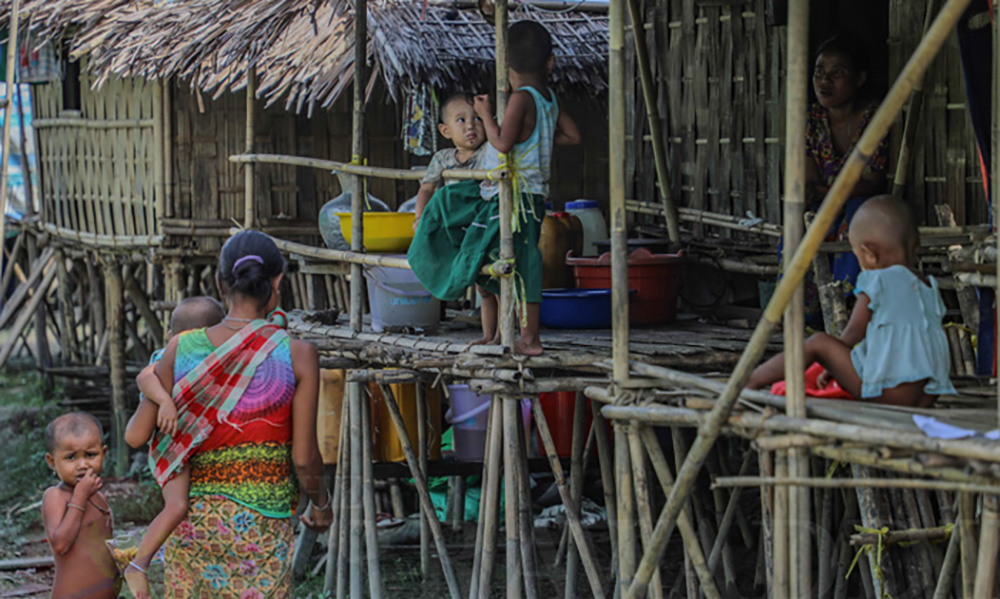With Myanmar facing challenges at home and abroad, people around the country celebrated the start of the new year. Many hope 2020 will bring peace, prosperity and happiness to the country, but it is not easy to fathom what’s in store for Myanmar this year.
The year 2020 should be an eventful one for Myanmar, as the country will hold a general election later this year. Myanmar’s last general election, held in November 2015, saw the National League for Democracy swept into power with a landslide victory. The election date has not been announced yet but many assume it will take place in November. Whatever the case, this is going to be the second election in “democratic Myanmar” and many hope it will be free and fair, but what political bargaining and horse trading will it lead to? We can only speculate.
The ruling party, the National League for Democracy, has no formidable or credible opposition—but political pundits say its main enemy lies within.
The government’s failure to advance the peace process or revive the sluggish economy, as well as incompetence in governance and bureaucratic reform are among the many key issues with which the opposition and critics have challenged the current administration.
Critics see the elected government as illiberal and authoritarian in nature and several ethnic leaders have been dismayed by the lack of vision and imagination the government has displayed when it comes to national reconciliation and tackling the country’s long-lasting ethnic conflicts.
The ruling party has no doubt lost the ethnic allies who in the past supported the NLD and its leader, State Counselor Daw Aung San Suu Kyi.
Voters want 2020 to mark not the start of another vicious cycle but a new beginning that will bring hope, excitement and a new future to the country.
One must admit that ethnic unrest and the impasse on reform have both worsened during the past year, and the government has been powerless to solve these issues.
Therefore, disappointment is widely shared among Myanmar citizens and hardcore activists, but they also ask: Do we have an alternative?
Constitutional reform is under way but the military, which occupies 25 per cent of the seats in the Parliament (Hluttaw), has fiercely opposed the process.
The ruling party proposes a gradual reduction in the armed forces’ role in national politics.
The military remains a powerful force in the country, but also faces stiff opposition from ethnic parties and ethnic armed groups, not to mention strong resentment from the population, who have seen and lived under military dictatorship.
Another major worry is the conflict in Rakhine State.
The strife in Rakhine continues to threaten the country’s stability, as the Arakan Army continues to grow strong in the north of the state, leading to a predictable expansion of the conflict.
The situation is critical, as the military conflict and humanitarian crisis continue unabated. To restore peace and stability in resource-rich Rakhine, the authorities must recognize the failure of past governments’ policies in the state and respect the Arakanese people’s calls for justice and equality, and their longing for peace and prosperity. Moreover, with refugees stranded on the Bangladesh border, the pressure on Myanmar will no doubt mount.

To be honest, today Myanmar is under two authorities: the National League for Democracy and the Tatmadaw, or military. Under this joint administration the country has seen instability, fragmentation and major crises including the refugee exodus into Bangladesh and the new armed conflict in northern Rakhine State.
As Myanmar faces internal challenges there are international players who continue to assist and engage the country. For better or worse, Myanmar is strategically located in Southeast Asia, flanked by two powerful nations, China and India. Myanmar is increasingly becoming a place for geopolitical competition between China and India, as well as between China and Japan.
The West’s influence continues to be felt, but China has the upper hand again. Perhaps China’s influence over Myanmar is a concern in the US and some Western capitals, but the fact is that while Beijing is engaging Myanmar more aggressively and assertively, it does so with few conditions. Myanmar sees the West’s approach as overly idealistic as it attempts to engage Myanmar, which it views as a vassal state of China.
Political observers say Myanmar is seen as moving closer to China. To some pundits, however, this means Myanmar is struggling to maintain a neutral and independent foreign policy. How long can that last?
Chinese President Xi Jinping is expected to visit Myanmar in the coming weeks. His visit will have many long-lasting implications, not least for the coming election.
On the positive side, this geopolitical competition could serve Myanmar’s national interest, but the country will have to tread carefully and play safe with different players. More importantly, Myanmar will have to protect its sovereignty and independence—even as some critics say the country is heading toward becoming a failed state. This is completely opposite to what many voters expected in 2015.
Let’s admit it: Myanmar is facing an emergency situation today. But we can still exchange New Year’s wishes and hope for a better future. In spite of the gloomy and depressing outlook, wishing for peace, prosperity and happiness in 2020 is a must.
You may also like these stories:
















